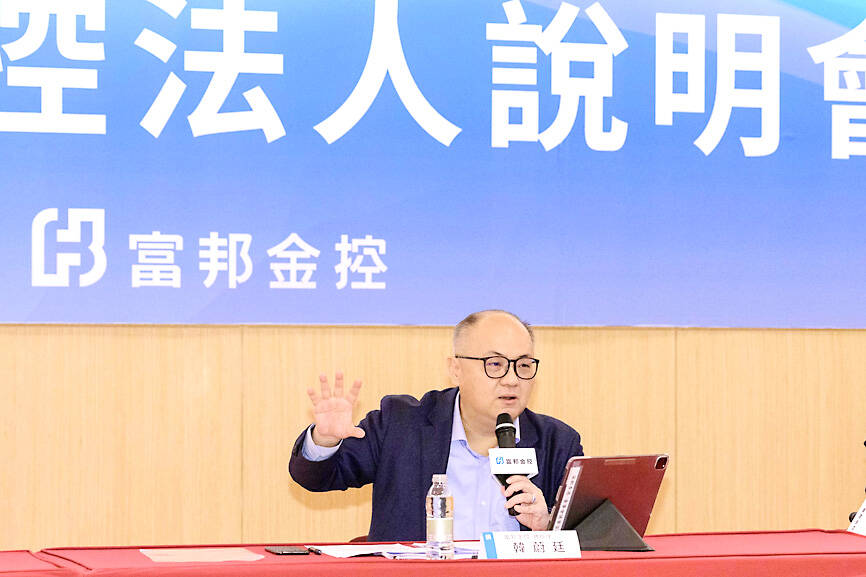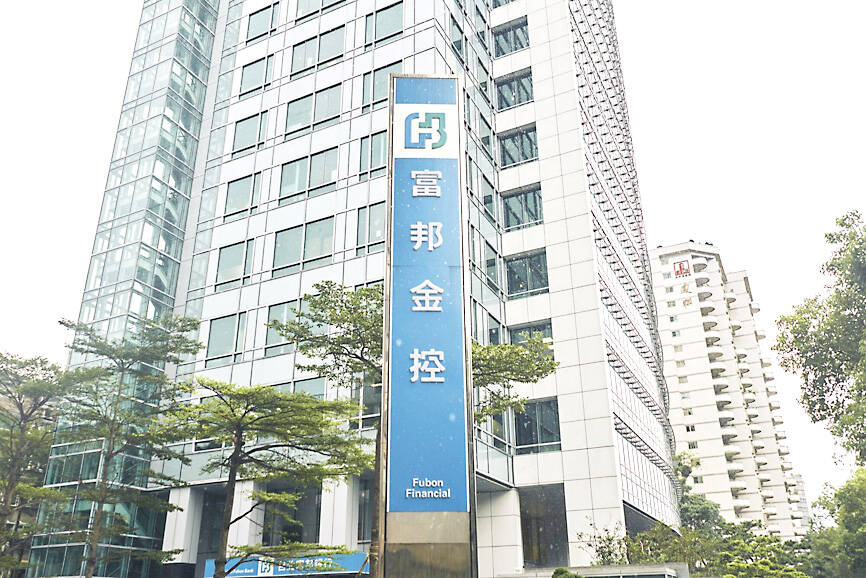Fubon Financial Holding Co (富邦金控) yesterday projected stable profit growth for the rest of this year even though net income in the first half shrank 38.2 percent annually to NT$42.9 billion (US$1.35 billion).
The conglomerate made the cautiously optimistic remarks during an investors’ conference after major subsidiaries reported that business improved amid a relatively favorable operating environment compared with last year.
Fubon Financial president Jerry Harn (韓蔚廷) said he believed China would introduce more stimulus measures to help its stalling economy.

Photo courtesy of Fubon Financial Holding Co
The group estimated its exposure in China at NT$840 billion, but the net sum would be NT$340 billion after factoring in NT$500 billion of assets at its Chinese banking subsidiary Fubon Bank China (富邦華一銀行).
That translates into a small 3 percent of Fubon Financial’s overall assets of NT$10.9 trillion, Harn told investors.
Fubon China incurred minor losses in the first six months after raising its general position at the request of Chinese financial regulators, officials said, adding that the conglomerate has no exposure to troubled Chinese developers.

Photo: An Rong Xu, Bloomberg
The nation’s most profitable financial conglomerate attributed the cash woes plaguing Chinese developers and local governments to years of COVID-19 lockdowns and the property sector’s overexpansion, but said it does not expect the problem to escalate into a financial storm.
“We have been cautious about China’s property sector and have focused on lending to Taiwanese firms there and Chinese national enterprises,” Harn said.
Fubon Life Insurance Co (富邦人壽) would see its income bolstered this quarter by cash dividends, which would be higher than last year, officials said.
The insurer hesitated to lower its hedging cost projection, saying they would amount to 100 to 150 basis points this year and would be higher than last year, as major central banks have no intention of easing interest rates in the near term.
By contrast, Taipei Fubon Bank (台北富邦銀行) might see its wealth management business grow 20 percent this year, faster than earlier predicted, officials said.
“Investment sentiment has improved much this year due to fewer black swan events,” officials said, adding that the recovery in financial markets at home and abroad also lent support.
While the group’s debt position remains in the red, stock holdings have turned positive, officials said.
Like other lenders in Taiwan, Taipei Fubon Bank raked in hefty profits from its currency swap operations, which might continue to generate earnings ahead under a similar environment, officials said.
Still, Fubon Insurance Co (富邦產險) accumulated losses of NT$3.22 billion in the first half due to lingering COVID-19 claims, although it swung to profit in April, officials said.
Things would gradually brighten at the subsidiary, the nation’s biggest with a market share of more than 20 percent, officials said.

NEW IDENTITY: Known for its software, India has expanded into hardware, with its semiconductor industry growing from US$38bn in 2023 to US$45bn to US$50bn India on Saturday inaugurated its first semiconductor assembly and test facility, a milestone in the government’s push to reduce dependence on foreign chipmakers and stake a claim in a sector dominated by China. Indian Prime Minister Narendra Modi opened US firm Micron Technology Inc’s semiconductor assembly, test and packaging unit in his home state of Gujarat, hailing the “dawn of a new era” for India’s technology ambitions. “When young Indians look back in the future, they will see this decade as the turning point in our tech future,” Modi told the event, which was broadcast on his YouTube channel. The plant would convert

‘SEISMIC SHIFT’: The researcher forecast there would be about 1.1 billion mobile shipments this year, down from 1.26 billion the prior year and erasing years of gains The global smartphone market is expected to contract 12.9 percent this year due to the unprecedented memorychip shortage, marking “a crisis like no other,” researcher International Data Corp (IDC) said. The new forecast, a dramatic revision down from earlier estimates, gives the latest accounting of the ongoing memory crunch that is affecting every corner of the electronics industry. The demand for advanced memory to power artificial intelligence (AI) tasks has drained global supply until well into next year and jeopardizes the business model of many smartphone makers. IDC forecast about 1.1 billion mobile shipments this year, down from 1.26 billion the prior

People stand in a Pokemon store in Tokyo on Thursday. One of the world highest-grossing franchises is celebrated its 30th anniversary yesterday.

Zimbabwe’s ban on raw lithium exports is forcing Chinese miners to rethink their strategy, speeding up plans to process the metal locally instead of shipping it to China’s vast rechargeable battery industry. The country is Africa’s largest lithium producer and has one of the world’s largest reserves, according to the US Geological Survey (USGS). Zimbabwe already banned the export of lithium ore in 2022 and last year announced it would halt exports of lithium concentrates from January next year. However, on Wednesday it imposed the ban with immediate effect, leaving unclear what the lithium mining sector would do in the